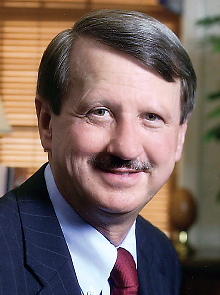Fellowship Funds Lifelong-Learning Initiatives in Psychiatry
Abstract
ABPN is providing $100,000 fellowships to educators in psychiatry and neurology who develop innovative programs to promote learning across the professional life span.
The American Board of Psychiatry and Neurology (ABPN) has created its Faculty Fellowship Award to support the development of innovative education and/or evaluation projects that promote effective residency and fellowship training or lifelong learning for practicing psychiatrists and neurologists.

CEO Larry Faulkner, M.D., says the new ABPN fellowship “supports innovative educators” whose work affects physicians throughout their careers.
“ABPN has always endeavored to support quality specialty and subspecialty training, and the development of maintenance of certification programs by the members of the American Board of Medical Specialties has led us to focus on lifelong learning for practicing psychiatrists and neurologists as well,” ABPN President and CEO Larry Faulkner, M.D., told Psychiatric News. “The goal of these awards is to support innovative educators whose work is likely to have a positive impact across the professional life spans of our candidates and diplomates,” he said.
Each year, up to two psychiatry and two neurology faculty fellows will be selected. The duration of the fellowship is two years, with a maximum amount of funding set at $50,000 per year for the fellowship award winner or a total of $100,000 for the two-year fellowship. The award covers salary, fringe benefits, and other costs. Fellows are required to spend at least 25 percent of their professional time and effort on the project.
This is the second year that the ABPN Faculty Fellowship Award has been offered, and the deadline for submissions is August 18. This year’s awardees will be announced November 3, with the funding to be disseminated in January 2015.
Michael Jibson, M.D., Ph.D., one of ABPN’s faculty fellowship awardees from earlier this year, is using his funding to analyze the psychometric properties of the Clinical Skills Verification (CSV) process and to assess its utility for measuring certain milestones in psychiatric residency training. Jibson is a clinical professor of psychiatry and director of residency education in the Department of Psychiatry at the University of Michigan Medical School.
ABPN announced in 2007 that general psychiatry training programs must conduct the CSV, consisting of observed clinical interviews and case presentations during residency training, as one requirement to establish whether residency graduates are ready to sit for ABPN’s written certification exam.
The CSV took the place of the live patient exam, conducted under a high-pressure situation. “The CSV is a better way of assessing how a resident interacts with and treats patients,” he said.
Jibson said that in 2009, the Accreditation Council for Graduate Medical Education (ACGME) began requiring that training directors perform an annual clinical-skills assessment, so the American Association of Directors of Psychiatric Residency Training Task Force on Clinical Skills Verification Training, of which Jibson was a member, expanded the CSV form to include two additional items—treatment planning and case formulation.
“These forms are now widely used by training programs and are accepted by the ABPN as evidence of competency in the areas of physician-patient relationship, conduct of the interview, and case presentation,” Jibson said. “My goal during the fellowship is to determine whether the CSV process in general, and these instruments in particular, are reliable and valid measures of those competencies.”
Jibson added that he has acquired a great deal of interrater and test-retest reliability data through his research, but no data have been published yet, so the ABPN fellowship will enable him to publish the data.
“I am also gathering additional data on the performance of the CSV in several other training programs to allow an assessment of its validity by examining how the scores change as residents go through training and how they correspond to other measures.”
Since the ACGME now requires residency programs to track residents’ progress with developmental milestones, Jibson is hoping to use the CSV form to help to track that progress as well. ■



